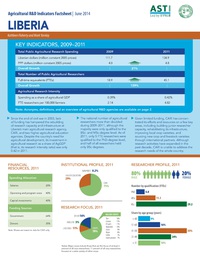Authors:
Kathleen Flaherty and Mark Yarnlay
Year:
2014
Publisher
International Food Policy Research Institute and Central Agricultural Research Institute
Back to:
Since the end of civil war in 2003, lack of funding has hampered the rebuilding of research capacity and infrastructure at Liberia’s main agricultural research agency, CARI, and two higher agricultural education agencies. Despite the country’s need for agricultural development, its investment in agricultural research as a share of AgGDP (that is, its research intensity ratio) was only 0.42 in 2011.
The national number of agricultural researchers more than doubled during 2009–2011, although the majority were only qualified to the BSc- and MSc-degree level. As of 2011, only 5 FTE researchers were qualified to the PhD-degree level, and half of all researchers held only BSc degrees.
Given limited funding, CARI has concentrated its efforts and resources on a few key areas, including building junior researcher capacity, rehabilitating its infrastructure, improving local crop varieties, and sourcing new crop and livestock varieties through international partners. Although research activities have expanded in the past decade, CARI is unable to address the research needs of the whole country.

